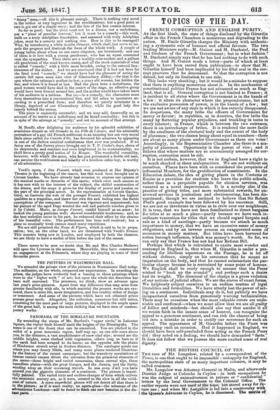TOPICS OF THE DAY.
FRENCH CORRUPTION AND ENGLISH PURITY. AT the first blush, the state of things disclosed by the Girardin affair in the French Chambers is monatroua and degrading to the nation. M. Emile Girardin charges the Ministry with authoriz- ing a systematic sale of honours and official favours. The two leading Ministers reply—M. Guizot and M. Duchatel, the Peel and Graham of the French Government ; but in what fashion M. Duchatel simply says that he has had nothing to do with such things. And M. Guizot reads a letter—parts of which at least ought to have been sacred from publication—to show that M. Girardin himself had been implicated by his filial zeal in the cor- rupt practices that he denounced. So that the corruption is not denied, but only its limitation to one side. This looks very shocking; but it would be a mistake to suppose that there is anything monstrous about it. In the mechanism of constitutional politics France has not advanced so much as Eng- land, that is all. General corruption is not limited to France • it is incident to all states where the Government is in the hands of a few : it alters its character where the preponderance, but not the exclusive possession of power, is in the hands of a flew ; but we are not aware of any state in which it has entirely disappeared. In despotisms, the many bribe the officers of Government for mercy or favour; in republics, as in America, the few bribe the many by flattering popular prejudices, and truckling in turns to every interest ; in France, which is between the two extremes; there is an interchange of bribes. It is rendered the more facile by the smallness of the electoral body and the extent of the body of placemen ; the two classes being about equal in numbers—there are about as many places under Government as there are votes ! Accordingly, in the Representative Chamber also there is a ma- jority of placemen. Opportunity is the parent of vice ; and it follows that where matters are so conveniently arranged for cor- ruption, corruption must be rife. It is not certain, however, that we in England have a right to be much shocked at these malepractices. We are not without sin ourselves. Places have been with us considered the perquisite of influential Members, for the gratification of constituents. In the Education debate, the idea of giving places in the Customs or , Excise as a provision for students who leave the public schools, rather than as a perquisite payable for election services, was vaunted as a novel improvement. It is a novelty also if the practice of giving titles, and more substantial rewards, for un- avowed services in journalism and electioneering, has been dis- continued; though we are inclined to believe that Sir Robert reel's good example has been followed by his successor. Still, we are not so inveterate in virtue as to crow over our neighbours. It is true, that we have not been familiarized to direct brat for titles at so much a piece—partly because we have sUciir- ordinate veneration for titles that we should regard bargain and sale as a kind of sacrilege—partly because we attach so much importance to money, that we have an excessive sense of money obligations, and by an inverse process an exaggerated sense of meanness in money matters. But titles have been bartered for rotten borough influence, which was money's worth. So far, we can only say that France has not had her Reform Bill. Perhaps that which is calculated to excite most wonder and contempt in England is, that when M. Girardin is under a pro- ceeding for libellous aspersions on the Peerage, he is let off without defence, simply on his assurance that he meant no imputation on the body, and that he cannot substantiate the par- ticular charge because he is restrained by some point of honour. , We English shall be ready enough to assume that the Peers- wished to "hush up the scandal"; and perhaps such a &slot had its weight. The dismissal of the charge is a gross violation , of our notions of judicial affairs. We are the slaves of exact forms. We helplessly subject ourselves to an endless routine of legal literalities and formalities. We have utterly lost the power of act- ing on a sentiment. Individuals may do it, but publicly we have incapacitated ourselves from generously waiving technicalities. There may be occasions when the most culpable errors are unde- niable and confessed—when we must allow that we are all guilty of follies and misdeeds—but should also say that amidst it all we retain faith in the innate sense of honour, can recognize the appeal to a generous sentiment, and can risk the chance of being led into a mistake in order to testify our reverence for such an appeal. The appearance of M. Girardin before the Peers was presenting such an occasion. Had it happened in England, we should have been self-precluded from acting as the French Peers did : they acted on a feeling, we should have demanded "facts." It does not follow that we possess the more exalted sense of real dignity.


























 Previous page
Previous page